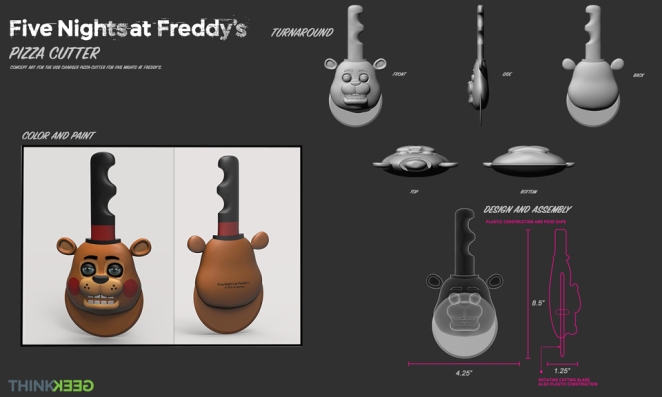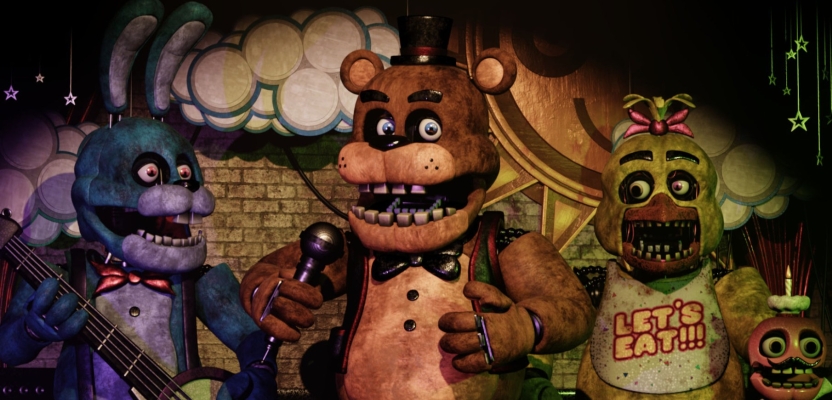At the time of writing, the feature film adaptation of the viral children’s horror game Five Nights at Freddy’s (known commonly by the acronym FNaF) has made over $250 million against a measly (by Hollywood standards) $20 million budget. It’s not exactly unprecedented, indeed, it’s the reason why horror remains such a lucrative venture with typically minimal overheads and a ravenous fanbase. What really sets this one apart, however, is the critical mauling the film has received.
Currently the film sits at 31% on Rotten Tomatoes against an 87% audience score, which begs the question; why? Because FNaF, above all else, is a brand and it’s a brand that’s taken over schoolyards across the world in the last 10 years.
The FNaF phenomenon
The FNaF video game franchise created by Scott Cawthon revolves around a series of haunted animatronic characters at a spooky pizza restaurant with players taking on the role of a security guard tasked with surviving a night at the restaurant. It’s a simple conceit with even simpler gameplay but it’s the ludicrous jump scares and the surprisingly deep lore of the thing that’s caused it to simmer under public consciousness for a full decade now.
In that time, the series has spawned over 20 entries of varying quality, as well as novels, comics and finally, of course, the feature film, released this summer. It’s a genuine cultural phenomenon among children of a certain age (and those adults who came of age during its ascent) and this strong brand recognition created significant anticipation for the film adaptation, even before a single frame was shot.
Effectively, the film didn’t need to be good, it just needed to use recognisable elements and tap into that sense of nostalgia that many Gen Z fans will have for the franchise and might even have passed onto their children. The sheer familiarity of the brand even generated curiosity among non-fans.
While quality is undoubtedly important in the world of entertainment and creativity, the success of the FNaF movie proves, to an extent, that brand recognition can often be more powerful. In my opinion, the following factors are at play here:-
Fan loyalty
Established brands have a dedicated fanbase that is loyal to the franchise. These fans eagerly await any new content, including movies, and are often willing to overlook minor flaws or deviations from the source material. This built-in fanbase provides a strong foundation for a movie's success.
Curiosity and nostalgia
Even people who may not consider themselves fans of the franchise may be curious about a movie adaptation of a well-known brand. Nostalgia can also play a significant role, as adults who grew up playing FNaF games may be drawn to the movie out of a sense of nostalgia.
Marketing and merchandising
Established brands have the advantage of extensive marketing and merchandising efforts. They can leverage their existing products and promotional materials to generate buzz and excitement for a movie, even if the quality of the film itself is questionable.
Lower expectations
In some cases, audiences may have lower expectations for movie adaptations of well-known brands. They may anticipate that the film won't be able to capture the essence of the source material or that it will make creative compromises to appeal to a broader audience. This lower bar for expectations can work in the movie's favour, as viewers may be pleasantly surprised if it exceeds those expectations.
Is it REALLY that bad?

Laurent Newman
Having sat down with the movie myself recently (for research purposes, of course), the FNaF movie did very little for me personally. I was honestly bored by the thing but then, I’ve never played a singe game and am a solid decade or two outside the target audience.
It is, however, a movie that knows what it’s doing and leans confidently into its lane. As a passive observer, I can say it managed to strike a delicate balance between staying true to the source material and offering a fresh perspective on the franchise. I could tell the thing would satisfy the core fanbase but it’s schoolyard appeal would also help it find its real home in years to come, in the bedrooms and basements of children discovering the joys of a good scare for the first time.
Are there better films that can achieve this same thing? Absolutely, but there are also soft drinks better than Coca-Cola and fast-food chains more appealing than McDonalds. At the end of the day, once a brand becomes cemented as part of the cultural zeitgeist, its yardstick gets moved beyond the realms of consideration for things such as quality and integrity. But then, at least it’s not another Marvel movie.




